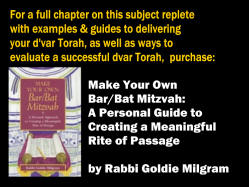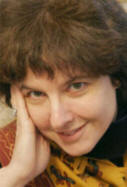What Is a Dvar
Torah
and
How to Create One that is Meaningful and
Inspiring
by Rabbi Goldie Milgram
So a pulpit or other
forum will be handed over to you,
exciting and a bit scary perhaps. You
will have the responsibility of helping
your community to find meaning for
living from within the parsha,
the Torah portion for the week.
Giving over meaningful guidance on the
Torah portion during a religious service
is not so much a speech as it is a
mitzvah, a sacred act called “giving
a d’var Torah.” A d’var,
“a word” of Torah, is a
brief teaching where you connect your
Torah portion with the heart, mind and
spirit of those present. Israelis often
refer to this practice as a derasha,
or drash, an “explanation” of the
Torah portion. There are 54 Torah
portions read over the course of one
year, and returned to with fresh eyes
and the lens of expanded life experience
every year.
While often given as an
oral presentation, aTorah teaching
can take many forms. Whether you can
offer a self-crafted talk, play, satire,
ballad, dance, visual art, poetry or
other formats will depend upon local
norms, the flexibility of your setting
and your own talents. This is a
precious opportunity which is meant to
reflect who you are as a member of your
community and to relate those ideals,
concerns and ideas that you believe will
be meaningful to those in attendance.
For a full chapter on
this subject replete with examples,
guides to delivering your d'var and ways
to evaluate a successful dvar Torah,
please obtain a copy of Make Your Own
Bar/Bat Mitzvah: A Personal Guide to
Creating a Meaningful Rite of Passage,
Chapter Five covers this topic
creatively, supportively and in-depth.
If you need help, a phone consultation
is available, rates on a gentle sliding
scale (ReclaimingJudaism.org is a
non-profit),
email to set an appointment.
Some recommended steps, these
can't all be done in one day. Take your
time, a dvar Torah is rarely a spiritual
emergency. If you accept a date to give
one, make sure it's well in advance so
you can enjoy the process, it's a
beautiful and usually powerful
experience:
First, find the Torah portion that
you will be studying. Be sure to have a
couple of different translations
available, because Hebrew is wonderfully
nuanced and each word can yield slightly
or greatly different interpretations
depending upon the individual or team
who are providing the text in the
language(s) you understand.
Second, don't forget the prayer for
Torah study if that is your practice,
then read through your Torah portion
once quickly to get the gist of the
whole thing.
Third, outline the portion. Just
like in school find the major sections,
then the points inside of those
sections.
Four, highlight points that bring
out a reaction in you.
Five, journal about one of the
sections where you find your own wisdom
or passions being impacted upon. Write
your thoughts and feelings.
Ideally find a partner to study with
whom to study this section, see what new
emerges.
Six, is a theme emerging for you? Is
one area of the portion becoming a focus
of your interest and attention? Maybe
only a few verses, one sub-story or even
a single fascinating word?
Seven, look up what sages throughout
Jewish history have had to say about the
section or verse(s) you are
reacting/relating to. You can juxtapose
their ideas with yours...there's
unlikely to be a wrong way to interpret.
Every life is a new lens that
illuminates the infinite possible
meanings of Torah. That's part of why
you were born, to contribute your own
vision, views and values to the Jewish
people's ever evolving meanings for the
text.
An easy way to find the sages is to
type in the book and numbers of the
verse in a search engine and the word "midrash,"
which is a major way the sages provide
commentary, by creating stories that
reflect their views about that section.
For example, if your are reacting to the
first verse of Genesis, you can search
on: Genesis 1:1 midrash
You can also type in the names of
scholars, sages and Jewish leaders you
admire, past or present, who might have
written on that section. You will almost
always find the sages Rashi and Rambam
have something to say, also try Aviva
Zornberg, Elyse Goldstein, Nehama
Liebovitz, z'l, Shefa Gold and Neil
Gillman to suggest a few of the hundreds
of wondrous commentators.
Eight, are there poems, songs,
vignettes, stories or quotes from others
that relate to the theme that might
connect to the wisdom you are emerging
from within about this portion?
Nine, look for symbols and metaphors
in the Torah portion. Water, for
example, symbolizes the attributes of
G*d and humans known as abundance, flow,
and lovingkindness. Knowing to look for
metaphor means you don't have to be
stuck in the apparent, literal meaning
of the text. Literal isn't often the
Jewish way of understanding Torah.
Ten, what is your theme? Let's say
you want to say that Dinah was not raped
by Shechem, but rather they fell in love
and Dinah's brother's couldn't tolerate
that she found someone on her own and
made love before marriage, so they held
the husband accountable and his family
for how they raised him, and slaughtered
them. How would you make this relevant
today? The Saudi Government has
increased the penalty to the female
victim of rape to be that she receives
200 lashes. You might talk about the
importance of Jews using Dinah's story
and how Judaism has evolved to not
punish the victim and to find and help
the perpetrators evolve. You
could speak with pride about the
evolution of your tradition, and
encourage those present to speak out.
You might share a story of courage of
someone who spoke out on the subject.
Eleven, jot down each point you need
to make, sequence them, insert
illustrations such as stories or
articles or such that you feel important
to briefly include. Create a flow
to your narrative, get to the point
where you really like the dvar that's
emerging.
Twelve, give the teaching to
yourself in a mirror, or tape and listen
or webcam yourself and watch (ideal).
Thirteen, practice on a friend, have
them tell you what they loved and what
would help them feel even more engaged
with the dvar, potential constructive
tweaks, not criticisms.
Fourteen, revise and revisit points
11-13 until you feel fully ready to
roll!. Mazel tov, congratulations on all
your effort and this precious
achievement.
 |
Rabbi Goldie Milgrim
is presently
spearheading an
initiative to establish
a National Bar/Bat
Mitzvah Teacher and
Tutor Training
Institute.
Her books offer
a unique perspective on
how to study and
interpret Torah
|
 |
This
material is used by permission of John
Wiley & Sons Inc, (Jossey Bass)
& Rabbi Goldie Milgrim.,
Copyright 2004, This
material may not be reproduced
in any form without permission.
Copyright Notice 2008,
FunSimcha.com. All rights
reserved.
|
|